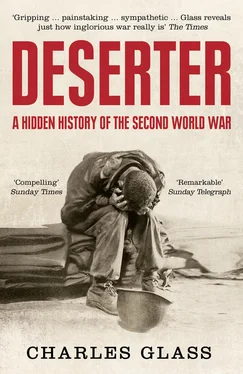He ‘disliked the Army very much,’ recalling his time in Scotland as ‘nearly two years of boredom, discomfort and misery, relieved by occasional booze ups …’ He resented his ‘early days in the army when he had first stood guard at Duff House in Banff in the cruel winter of 1941 … protecting the old mansion against imaginary German parachutists dressed as nuns’. From the ways that Bain revisited his Army service in letters, books and poems, he appeared to have been pathologically unsuited to soldiering. He wrote, ‘By nature I was impractical, unpunctual, and clumsy, attributes that do not endear themselves to military authority.’ Thirty years after the war, his thoughts turned
… not so much to memories of battle but to the grinding tedium of service in the United Kingdom, training, manoeuvres, guards, courses, discomfort, humiliation, frustration, boredom and – rarely but unforgettably – moments of bizarre comedy, excitement and the joy of extraordinary physical well-being when food, warmth and the rest were not commonplace elements which we had the automatic right to expect in the pattern of our days but pleasure as real intensity, positive blessings.
In common with other British youngsters of the time, Bain had little experience of people from other classes. His own background was what he described as ‘working class but with aspirations of an entirely materialistic kind towards stifling gentility’. His mother read books and kept a piano, and his father worked for himself in a photography studio. Officers, some with no leadership qualifications apart from the right accent, irritated him, but the ‘other ranks’ seemed almost a foreign species. When one of them asked his name, he answered, ‘Vernon,’ his middle name that he had been called all his life. Bain recalled the squaddies’ mocking question: ‘“Vernon? What’s that?” And I’d say, “John”, quickly, which they could handle. So, I became “John” in the army.’
‘A lot of the chaps in the 70th Argylls were from the Glasgow slums, the Gorbals,’ he recalled, ‘and had pretty disgusting habits.’ In another reflection on his fellow squaddies, he wrote, ‘My comrades were mostly sub-literate, embittered children of the general strike, from the slums of Glasgow and Edinburgh.’ One of them pilfered Bain’s gold boxing medal, indicative of the petty thievery rampant in the ranks. Nevertheless, he wrote, ‘They would happily stick by you, and they were generous.’ Paid only two shillings a day, the Jocks gave their last pennies to comrades in need or to stand a friend a pint. The only person Bain trusted was his brother Kenneth, who was transferred to the Royal Engineers a year into their enlistment. That was about the time John ran away for three weeks.
To get along, Bain concealed from his squad mates his passion for books, poetry and classical music. In fact, he gave up reading altogether. ‘I deliberately suppressed that part of myself that I most valued,’ he wrote.
I became ashamed of my interest in literature, ideas and the arts. I consciously adopted a mask with forehead villainous low. I was already, at eighteen, greedily addicted to beer, so no acting ability was needed to play the part of boozer. My interest in boxing was genuine and my skill was respected, so it was not difficult for me to flex my muscles and roar with the roaring boys. But it was not good for me either. It was shameful and brutalizing.
After the transfer to B Company of 5/7th Gordon Highlanders, Bain made one good friend. Private Hughie Black was a working-class Scotsman of roughly his age and with a more profound contempt for officers. Black’s cynicism about the military had a hard class edge to it, and he would have stayed out of the war if it had been possible. The six-foot boxer from Buckinghamshire and the five-foot six-inch Glaswegian made an odd if comradely pair. Like most Scotsmen, Black said ‘aye’ for ‘yes’ and expressed himself in a rich vocabulary of profanities including ‘Fucky Nell.’ He called Bain ‘china’, as in ‘china plate’, rhyming slang for ‘mate’. If Bain had a friend to replace his brother in B Company, it was streetwise Hughie Black.
The tedium of training and guard duty came to an end on 20 June 1942, when the Gordons with the rest of their Highland Division regiments boarded the Spirit of Angus and other ships on the Clyde estuary and at Liverpool and Southampton. Their destination, in common with most other troop embarkations during the war, was withheld from the soldiers. The convoy of twenty-two troopships, escorted by eight destroyers, headed south through the Bay of Biscay towards Africa. For most of the youngsters, it was their first time out of Britain.
The 5/7th Gordons were part of the 51st Highland Division, commanded by forty-three-year-old Major General Douglas ‘Tartan Tam’ Wimberley. Wimberley stood six-foot-three, usually wore a kilt and waged a futile struggle with the high command to exclude English and Lowland Scots regiments from his division. His predecessor in command of the Highland Division was Major General Victor Morven Fortune. Fortune and the original division were then languishing in German prisoner of war camps, following their surrender to German General Erwin Rommel at Saint-Valéry-en-Caux during the Battle of France in June 1940. The lucky units that managed to escape to Britain formed the core of the reconstituted Highland Division. The glorious histories of the 51st Division and its component regiments, like the Black Watch with its legacy in Egypt dating to the original British conquest of 1882, held no allure for Bain. Then and later, he refused to sentimentalize either war or the army.
Bain and his fellow Gordon Highlanders lived in confined quarters at sea, resenting the privacy and better rations afforded the officers. Bain said later of his comrades, ‘They had no respect for their officers.’ They amused themselves with cards and boxing. To cheers from his mates in the 5/7th Gordons, Bain defeated a sergeant from the Cameron Highlanders.
On 21 June, the day after the convoy set sail, Britain suffered a major defeat, its fourth of the war after the loss of France, Singapore and Burma. Rommel, who had captured the original 51st Division in France, conquered the Libyan port town of Tobruk and inflicted a casualty toll on British and Commonwealth forces of 35,000. The Australian war correspondent Alan Moorehead, who covered the North African campaign for Britain’s Daily Express , wrote, ‘It was defeat as complete as may be.’ Britain’s Commander-in-Chief of Middle East Forces, General Claude John Eyre Auchinleck, pulled his troops back well into Egypt to the coastal railhead at El Alamein. The thinly defended Alamein Line, running between the Mediterranean in the north and the impassable Qattara Depression in the south, lay only sixty miles in front of Alexandria. The Royal Navy had meanwhile evacuated Alexandria’s harbour to avoid capture by the advancing Axis forces. This news, hardly a boost to morale, reached the Highland Division while it was far out at sea. Some of the men guessed that they were on their way to reinforce Britain’s battered desert defences, but officially they were told nothing.
The ships refuelled at Freetown, Sierra Leone, but the men were not permitted ashore lest they contract malaria. As the convoy cruised further south along the African coast, the soldiers on board remained unaware that in Egypt their comrades had succumbed to panic that the British called ‘the flap’.
In Cairo, on 1 July, burning documents at Britain’s embassy and military headquarters sent up billows of smoke so thick that the day became known as ‘Ash Wednesday’. Trains leaving the Cairo station for British Palestine overflowed with passengers and baggage. British subjects queued outside Barclay’s Bank to withdraw their money. A mood of defeat prevailed, as Alan Moorehead, whose wife and baby had taken a train to Palestine, observed on the road between Cairo and Alexandria. It was, he wrote ‘a full scale retreat. Guns of all sorts, R.A.F. wagons, recovery vehicles, armoured cars and countless lorries crammed with exhausted and sleeping men, were pouring up the desert road into Cairo … The road on our side – the side that carried vehicles up to the front – was clear …’
Читать дальше












